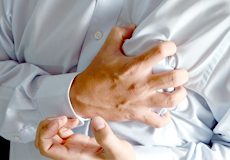Chest pain is a common symptom which can be caused by many different conditions. Causes of chest pain can vary from minor problems, such as indigestion, to serious medical emergencies, such as a heart attack. The specific cause of chest pain is often difficult to interpret. Thus, a precise diagnosis is crucial.
What is a heart attack?
 A heart attack takes place when there's a blockage in an artery supplying your heart with blood and oxygen, damaging the heart muscle. Generally, chest pain occurs for more than 15 minutes. However, heart attacks can also be "silent" with no apparent symptoms or warnings but in many cases the warning symptoms can be hours, days or weeks in advance.
A heart attack takes place when there's a blockage in an artery supplying your heart with blood and oxygen, damaging the heart muscle. Generally, chest pain occurs for more than 15 minutes. However, heart attacks can also be "silent" with no apparent symptoms or warnings but in many cases the warning symptoms can be hours, days or weeks in advance.
Indicators of a heart attack:
-
Frequent chest pain generated by physical exertion and calmed by rest can be the best sign of an attack; it could last for several minutes or be on and off. For example, uncomfortable pressure, fullness or squeezing pain in the center of the chest.
-
Lingering pain in the are above the stomach.
-
Discomfort spreading to the shoulders, neck, jaw, teeth, or one or both arms.
-
Shortness of breath.
-
Lightheadedness, dizziness, fainting.
-
Sweating.
-
Nausea.
What to do when having a heart attack?
-
Call for emergency medical assistance (Dial 997). If there is no assistance have someone drive you to the hospital as the first five minutes are critical. Try not to drive yourself unless it is the last option.
-
If allowed, chew and swallow an aspirin.
-
If you had been previously prescribed nitroglycerin, take it as directed and do not use anyone else' prescription.
-
If the person is unconscious, inform the medical help and follow CPR procedures. If you don't have CPR training, doctors recommend skipping mouth-to-mouth to directly perform chest compression.
What is a pulmonary embolism?
It is the condition that occurs when a blood clot originating in large veins (in the leg or pelvis) lodges in an artery of your lung. Call for emergency medical assistance (Dial 997) if you notice any of the following symptoms:
-
Unexpected, sharp chest pain that begins or worsens with a deep breath or a cough. It is often accompanied by shortness of breath.
-
Unexpected and unexplained shortness of breath (sometimes without pain).
-
Coughing leading to blood-streaked sputum.
-
Rapid heartbeat.
-
Anxiety and extreme sweating.
What is pneumonia with pleurisy?
Symptoms of pneumonia
Pleurisy is a condition that occurs when pneumonia is accompanied with an inflammation of the membranes that surround the lung. In this condition pain is temporarily relieved by holding the breath or putting pressure on the painful area in the chest which does not happen with a heart attack. Pleurisy alone isn't a medical emergency. However, see a doctor if a cough and a fever or chills accompany the chest pain.
What is chest wall pain?
Chest wall pain is one of the most common types of risk-free chest pain. When you place pressure over a few points along the edge of the sternum and find substantial tenderness in just those small areas and the pressure copies the pain, you probably can conclude that a serious cause of chest pain, such as a heart attack, isn't responsible.
What are the other causes of chest pain?
-
The chest muscles became strained from overuse or too much coughing.
-
A minor trauma that caused the bruising of the chest muscle.
-
Acute anxiety with rapid breathing.
-
Pain from the gastrointestinal tract, e.g. gallbladder pain.
................................................................................
This information is provided by the NGHA
Content Advisory Board and is not intended to replace the medical advice of your health care provider.